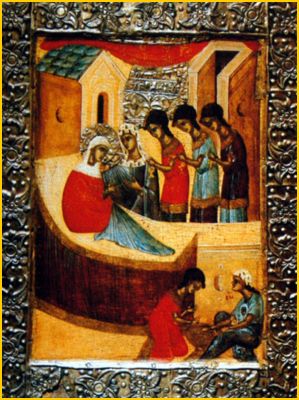|
|||
|---|---|---|---|
| This weekly bulletin insert complements the curriculum published by the Department of Christian Education of the Orthodox Church in America. This and many other Christian Education resources are available at http://dce.oca.org. | |||

The Church remembers three saints of the Church who experienced great anguish in their lives, for different reasons. But the three also received the compassion and comfort that God gives. Joachim and Anna were, of course, the parents of Mary the Mother of God. Joachim was descended from King David, and Anna was the daughter of a priest. They were devout, and offered much of their income to the Temple and for the relief of the poor. But before their child's birth, which happened late in their lives, they lived through long and lonely years of being without any children. This was not only a source of sorrow, but also of humiliation and rejection. One time when they had traveled to Jerusalem to offer sacrifice in the Temple, the high priest said haughtily to Joachim, "You are unworthy to offer sacrifice with your childless hands." Others pushed Joachim aside, and he and Anna were forced to leave the Temple and make the journey home in deep sadness. So God's compassion, answering their fervent prayers with the birth of Mary, was especially sweet to this couple. The Church also remembers the Blessed Nicetas, called "Man of God" and also "the Hidden." This latter name refers to his spiritual efforts, which were extraordinary but unseen and unknown by those around him. Even though he lived in the busy city of Constantinople and was surrounded by people all day, he found time for intense prayer and secret good works that brought him very close to God. Among the blessings he received during his holy life, Nicetas was once able to ease another man's anguish and call down God's compassion on him. This other man, a deacon named Sozon, had quarreled with a priest. They never resolved their argument, and the priest died. Sozon was grief-stricken at having let the rift continue until it was too late. Sozon's guilty conscience eventually led him to Nicetas, who was able to call the priest back from the dead so that he and Sozon could be reconciled. The miracle took place at night, in the church of the Blachernae Mother of God in Constantinople. After Sozon and the priest embraced each other, Nicetas disappeared from their sight; once again he became "Nicetas the Hidden." For the rest of his life, Sozon was free of the anguish of an unresolved quarrel. In II Corinthians 1:21-2:4 Saint Paul also speaks about being in anguish. Having already experienced one painful visit to the Corinthian church, he was reluctant to make another, so he had instead written a rather harsh letter. He felt he needed to explain its tone: "For I wrote you out of much affliction and anguish of heart and with many tears, not to cause you pain but to let you know the abundant love that I have for you." Paul, too, was grateful for God's compassion which eased his anguish. He writes in 7:4, "[Even] with all our affliction, I am overjoyed." |
|||
